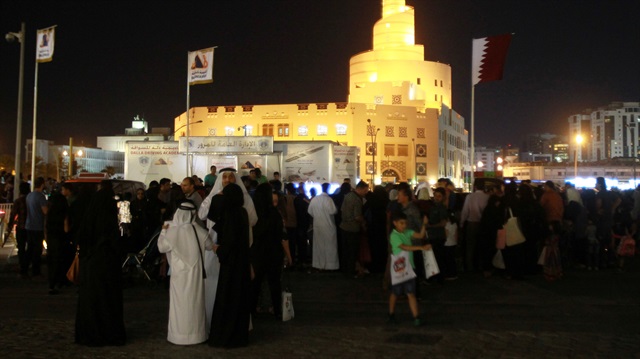

People are seen at Souq Waqif market in Doha, Qatar
Citizens of tiny Gulf state say worst is over thanks to country's strong economy and deep political alliances
Qataris who spoke to Anadolu Agency on Friday appeared upbeat despite the tiny Gulf state’s ongoing diplomatic crisis.
Many, however, also voiced anger over moves by fellow Arab countries to cut diplomatic relations -- and food supplies -- during the Muslim fasting month of Ramadan.
Awad al-Khalid, a Qatari citizen of Syrian origin who runs a restaurant in capital Doha, said he had yet to feel the effects of the sanctions.
Noting Qatar’s strong economy and longstanding political affiliations, he said: “I don't think the Gulf Cooperation Council will allow this crisis to continue.”
“If they [the states that cut ties with Doha] don't reverse course, Qatar has a number of alternatives it can rely on, such as Turkey, Iran and Russia,” he added.
Al-Khalid went on to assert that the sanctions currently aimed at Qatar constituted a violation of human rights.
“It’s disturbing to see Muslim countries behaving like this. We’re all Muslims; cutting food supplies during Ramadan is in very bad taste,” he said.
“The decision to embargo Qatar was taken by leaders, not the Muslim community,” he added. “At first people panicked, but now daily life has returned to normal.”
“The main reason for this aggressive attitude towards Qatar is hostility on the part of [U.S. President] Donald Trump and the GCC towards Palestinian resistance group Hamas and Egypt’s Muslim Brotherhood,” al-Khalid said.
He went on to point to Turkey’s role, saying: “Turkish President Recep Tayyip Erdogan is a smart leader; he knows what he’s doing. He won’t abandon us.”
Dismissing allegations that Qataris were worried, Rashid, a Qatari citizen who preferred not to give his last name, said: “We aren’t worried, we’re angry.”
He added: “We are deeply upset over these sanctions against Qatar, which we did nothing to deserve.”
Jeila Jemil al-Tamimi, a woman of Palestinian origin who has lived in Qatar for more than 30 years, told Anadolu Agency: “The markets are brimming with products. We still have all our everyday needs. The media isn’t telling the truth in this regard.”
Noting that most Qataris were pleased with Turkey's stated support for Qatar, al-Tamimi added: “The Turkish position is a stand against cruelty. There’s a propaganda campaign being waged against our country.”
-‘Shocked’
Isna al-Tamimi, a Qatari citizen who works for a gas company, said it was “hard to comprehend” what exactly Qatar’s fellow GCC countries were up to.
“I was shocked when I first heard about it. I initially thought it must be a joke since Qatar has always stood by its fellow Muslim countries,” she said.
“But the crisis has served to open alternative doors. The amount of goods purchased from Turkey is proof of this. We stand by our emir and our country; we haven’t done anything wrong,” she added.
“The same hidden powers tried to carry out a military coup in Turkey in hopes of taking Erdogan down,” she asserted. “At first we were worried, but everything’s normal now.”
Despite the political and economic embargo imposed on the country, Qataris nevertheless appear to be enjoying Ramadan.
Doha’s tea gardens, shopping malls and streets teem with citizens enjoying the fasting month, while local markets are brimming with Turkish products.
Speaking to Anadolu Agency, most Qataris said that everyday life had largely returned to normal after a first day of panic when the crisis began.
Employees at one supermarket in Doha stressed there was no longer any need for concern or panic.
“There is no need to hoard commodities,” one of them said. “There are plenty of goods to go around.”
On Monday, five Arab countries -- Saudi Arabia, Egypt, the United Arab Emirates, Bahrain and Yemen -- abruptly cut diplomatic ties with Qatar, accusing Doha of supporting terrorism.
Mauritania followed suit the following day, while Jordan downgraded its diplomatic relations with Doha.
Saudi Arabia has also closed its land borders with Qatar, geographically isolating the tiny Gulf state.
Qatar, for its part, has strenuously denied accusations that it is a supporter of terrorism, describing the moves to diplomatically isolate it as “unjustified”.
#diplomatic crisis
#Gulf crisis
#Qatar
#Ramadan
#Turkey

